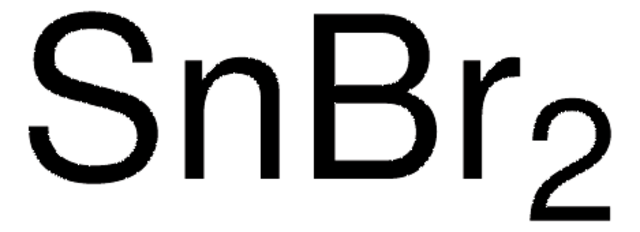203017
Cesium bromide
99.999% trace metals basis
Synonym(s):
Cesium monobromide
About This Item
Recommended Products
Assay
99.999% trace metals basis
form
powder and chunks
impurities
≤15.0 ppm Trace Metal Analysis
mp
636 °C (lit.)
density
4.44 g/mL at 25 °C (lit.)
SMILES string
[Br-].[Cs+]
InChI
1S/BrH.Cs/h1H;/q;+1/p-1
InChI key
LYQFWZFBNBDLEO-UHFFFAOYSA-M
Looking for similar products? Visit Product Comparison Guide
Related Categories
General description
Application
- An electrolyte additives to improve the cycling efficiency of lithium and graphite anodes in lithium-ion batteries. The cesium cations can help control the interfacial chemistry on the anode, leading to enhanced performance.
- An additive to enhance the efficiency and stability of CsPbI2Br perovskite solar cells by passivating defects, improving charge transport properties, and contributing to higher power conversion efficiencies.
- As a precursor material to synthesize cesium lead bromide (CsPbBr3) perovskite, which is then utilized as an electrode material in a symmetric supercapacitor.
- As a precursor to prepare thermal neutron imaging plates.
- As a precursor to synthesize lead-free CsBr: Eu2+ nanocrystals for fabricating white LEDs.
- As an additive to prepare CsI-based scintillators. Alloying with cesium bromide increases the yield limit and microhardness of CsI crystals.
Signal Word
Warning
Hazard Statements
Precautionary Statements
Hazard Classifications
Acute Tox. 4 Oral - Aquatic Acute 1 - Repr. 2
Storage Class Code
13 - Non Combustible Solids
WGK
WGK 3
Flash Point(F)
Not applicable
Flash Point(C)
Not applicable
Personal Protective Equipment
Certificates of Analysis (COA)
Search for Certificates of Analysis (COA) by entering the products Lot/Batch Number. Lot and Batch Numbers can be found on a product’s label following the words ‘Lot’ or ‘Batch’.
Already Own This Product?
Find documentation for the products that you have recently purchased in the Document Library.
Customers Also Viewed
Articles
Colloidal quantum dots (CQDs) are semiconducting crystals of only a few nanometers (ca. 2–12 nm) coated with ligand/surfactant molecules to help prevent agglomeration.
Our team of scientists has experience in all areas of research including Life Science, Material Science, Chemical Synthesis, Chromatography, Analytical and many others.
Contact Technical Service













